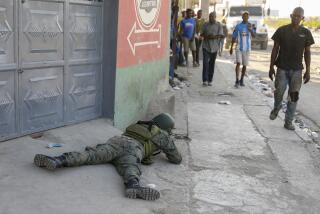Haiti Military Hurt by Sanctions, Officials Say : Caribbean: Christopher claims rulers feel pressure as economic curbs gain ‘traction.’ He says invasion may not be needed.
- Share via
WASHINGTON — Senior Clinton Administration officials said Thursday that they are seeing encouraging signs that economic sanctions are putting so much strain on Haiti’s military regime that a U.S. invasion may not be needed to restore the elected president to power there.
“We’re now getting some traction” from sanctions, Secretary of State Warren Christopher told the Senate Foreign Relations Committee.
“I think they will ultimately be out because of the pressure we’ve brought,” he said, referring to Haiti’s military rulers.
Asked whether the Administration favored an invasion to overthrow the regime and reinstall exiled President Jean-Bertrand Aristide, Christopher said: “No . . . the option we’re pursuing now is to try to increase the pressure through the use of sanctions.”
He said many of the sanctions were “relatively recent,” and he argued that they should be given time to work before military options are considered.
Christopher’s comments echoed a statement a day earlier by Defense Secretary William J. Perry, who has publicly expressed opposition to an invasion.
Another senior official said U.S. intelligence analysts have detected increasing signs of strains in Haiti’s ruling elite, including apparent conflict between Lt. Gen. Raoul Cedras, the military chief of staff, and other leaders of the regime.
“There’s a lot going on in Port-au-Prince that we can’t talk about in detail,” one official said. “Each individual is feeling pressure.”
The officials spoke after White House meetings on Monday held to review the Administration’s sanctions policy, as well as its efforts to provide facilities for thousands of refugees who have sailed from Haiti during the last week.
Early Wednesday, police reportedly fired on a 60-foot boat carrying would-be refugees off the southern coast village of Nan L’Etat, causing a panic in which 30 to 40 refugees drowned.
The report came Thursday from two Western journalists, who quoted witnesses.
The Coast Guard said it picked up at least 700 more refugees from the waters off Haiti on Thursday, bringing the total number rescued over the last six days to more than 4,000.
Only one day after President Clinton announced the reopening of a tent city for refugees at the U.S. Navy base at Guantanamo Bay, Cuba, 1,123 Haitians were being housed there, officials said.
The flood of refugees appeared to increase pressure on the Administration for a solution to the Haitian impasse.
But officials insisted that, at least for now, Clinton is not being pushed toward a decision to invade.
Several Republican senators warned Christopher that they will fiercely oppose any military intervention in Haiti.
“I don’t believe that there is any vital national interest or strategic reason for the United States to risk even one life of one American service person to restore Aristide to power,” Sen. Jesse Helms (R-N.C.) said. “If we do invade, and that first body bag comes out, that’s when all hell is going to break loose.”
Christopher disagreed.
“Our interests in Haiti are very strong ones,” he said. “It is in our own back yard. Stability in the Caribbean and in the region really is dependent upon not having elected leaders overthrown by an illegitimate group of thugs.”
On Wednesday evening, the Senate rejected, 65 to 34, a Republican-sponsored measure that would have required Clinton to obtain formal authorization from Congress before taking any military action in Haiti.
In Jamaica, U.S. officials working around the clock processing Haitian refugees on a Navy hospital ship anchored in Kingston harbor began shuttling the overflow to Guantanamo Bay.
Of the more than 4,000 Haitians picked up, 978 have been interviewed by the Immigration and Naturalization Service.
Officials said 301 of them have been found to have “a well-founded fear of persecution,” which is the official standard for winning refugee status, and are awaiting transport to the United States, Canada or other countries.
With a capacity of 12,500, the Guantanamo naval base is seen as an easily readied emergency camp to be used only until a more permanent asylum center is opened in the Turks and Caicos Islands.
But at the current rate of exodus, refugees threaten to quickly fill both the Guantanamo camp and the Turks and Caicos station, which has a planned capacity of 2,000. It will open by July 15, officials said.
*
Special correspondent Mike Clary in Kingston, Jamaica, contributed to this report.
More to Read
Sign up for Essential California
The most important California stories and recommendations in your inbox every morning.
You may occasionally receive promotional content from the Los Angeles Times.














